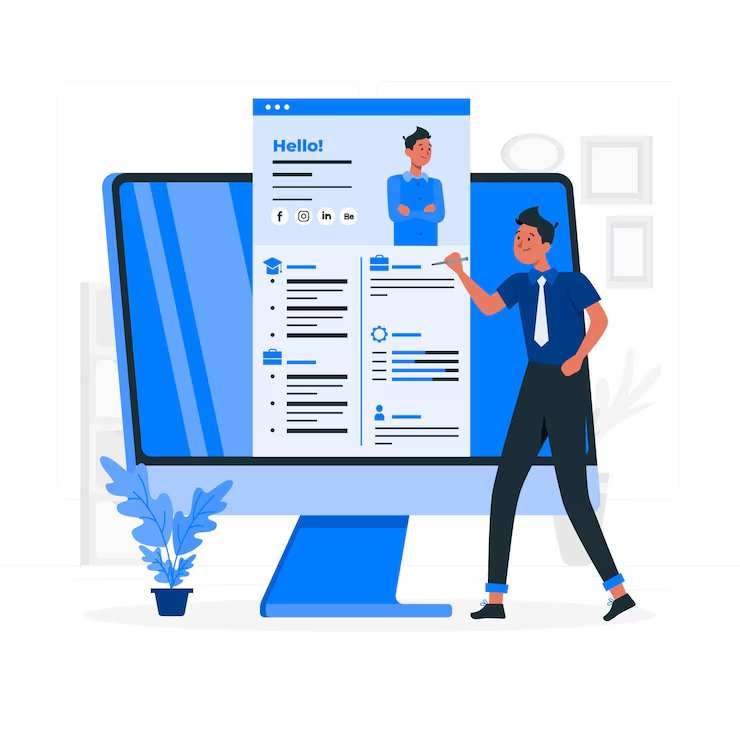How Many Pages Should a Resume Be for Any Profession? [2025 Edition]
Published on September 2nd, 2024
Since half of 2024 is already behind us, and if you’re considering a job change, your resume is one of the most critical tools to get right. With evolving hiring trends, getting your resume in top shape can make a difference in standing out from other candidates.
One question often arises when preparing or updating a resume: How many pages should my resume be? Whether you're just starting your career, considering a mid-level switch, or climbing to senior-level positions, the length of your resume plays a significant role in how effectively you present your skills and experience.
This article will help you navigate the ideal resume length, how far back your experience should go, and how to tailor it based on your career stage. Whether you're applying for entry-level positions or senior roles, you’ll learn how to create a resume that suits your needs, captures your attention, and increases your chances of landing that next job.
How Long Should a Resume Be?

The length of your resume is a key factor in making a positive impression on hiring managers. Most resume templates should be between one and two pages long. But, some can be three pages or more. While there isn't a one-size-fits-all answer, the general consensus is to keep your resume as concise as possible while still conveying all relevant information.
- Industry-specific expectations: Industries like finance, consulting, and marketing often prefer a concise, one-page resume. On the other hand, academic, scientific, and government positions may require longer resumes or CVs to capture a more detailed work history and achievements.
- Career stage considerations: For those just starting out, a one-page resume is typically sufficient. If you have mid-level experience or more than 5-10 years of work history, a two-page resume is appropriate. For those in specialized fields or with extensive experience, a three-page resume may be acceptable, though rare.
How Far Back Should a Resume Go?
The extent of your work history that you should include depends on your level of experience and the relevance of each position to the job you are applying for.
- General rule: A resume should generally go back 10 to 15 years, especially if you have been in the workforce for a significant time. This timeframe provides employers with a clear view of your most recent and relevant accomplishments.
- Relevance over chronology: Prioritize roles that align with the job you're applying for. If your experience from more than 15 years ago is particularly relevant to the role, you can include it, but you should avoid detailing every position from early in your career.
- For early-career professionals: If you're relatively new to the workforce, include internships, volunteer roles, and other positions that highlight your transferable skills. In this case, your resume might go back only 3-5 years, but focus on making your limited experience count by highlighting your skills and accomplishments.
Resume Length for Your Experience Level
Tailoring your resume to the amount of experience you have is critical for ensuring it makes an impact without being either overwhelming or underwhelming.
- Entry-level candidates: If you are new to the workforce, your resume should be no longer than one page. Highlight internships, relevant coursework, volunteer work, and skills, while keeping the focus on your potential and how it aligns with the job you're targeting.
- Mid-level professionals: With 5-10 years of experience, a two-page resume is often necessary to fully cover your accomplishments and skills. Focus on your most relevant roles and make sure each experience is tied to the job description for the position you're seeking.
- Senior professionals: Senior-level candidates or those in specialized fields may need a three-page resume to adequately reflect decades of experience, leadership roles, and high-level accomplishments. However, avoid listing every job you've ever had — focus on the most important roles and achievements.
The One-Page Resume
A one-page resume is still a popular option, especially for entry-level professionals and those applying to roles in industries that value conciseness, such as tech, finance, and marketing.
- Advantages of a concise format: A one-page resume forces you to highlight the most relevant aspects of your experience. It can make a strong impression because hiring managers spend only a few seconds initially scanning resumes.
- When to use a one-page resume: If you're early in your career, switching industries, or applying for roles that require only a summary of skills and experience, a one-page resume is ideal.
- Tips for effective one-page resumes: Use bullet points, quantifiable achievements, and action verbs to make the most of limited space. Keep formatting clean and professional.
The Two-Page Resume
For professionals with more experience, a two-page resume is often more practical and can offer a fuller picture of your career trajectory.
- When a two-page format is appropriate: Mid-level professionals with 5-10 years of experience, or those applying for positions that require in-depth technical skills, often need two pages to represent their qualifications fully.
- How to structure a two-page resume: Ensure the second page adds value. Start with the most recent, relevant positions on the first page and leave older or less relevant positions for the second page. Keep formatting consistent and avoid blank spaces at the bottom of either page.
The Three-Page Resume and Beyond
A three-page resume is uncommon but may be necessary in specific fields such as academia, research, or for senior-level executives.
- When a longer resume is necessary: Positions in academia or research often require detailed resumes (or CVs) to document accomplishments like publications, research projects, and speaking engagements.
- Considerations for specialized industries: In fields like science, medicine, or government, a longer resume is acceptable and even expected. The key is to balance providing sufficient detail while maintaining readability.
In a simple way,
Resume Length Recommendations by Experience Level
| Experience Level | Recommended Resume Length | Key Focus |
Entry-Level | 1 Page | Highlight internships, relevant coursework, volunteer work, and skills. Focus on potential and alignment with the job. |
Mid-Level | 2 Pages | Highlight most relevant roles, tie experiences to job descriptions. Use two pages to fully cover accomplishments and skills. |
| Senior-Level | 3 Pages or more | Focus on important roles and achievements. Avoid listing every job; reflect leadership roles and specialized accomplishments. |
Tailoring Your Resume Length
Whether your resume is one page or more, it’s essential to tailor it to the specific job you're applying for. Each role may call for different information or a different length.
- Customizing for specific applications: Tailor your resume by emphasizing experiences and skills that align with the job description. Irrelevant information should be cut to ensure your resume stays focused and concise.
- Strategies for condensing or expanding content: Use bullet points and action verbs for brevity. When expanding content for a longer resume, focus on providing details that demonstrate impact, such as quantifying achievements or elaborating on complex responsibilities.
The Role of Formatting in Resume Length
Formatting plays a crucial role in how much information you can fit on your resume without it appearing crowded.
- Font size and style: Stick with readable fonts like Calibri or Arial, and use a font size between 10 and 12 points. Avoid reducing the font size to fit more information on the page.
- White space and margins: Proper use of white space improves readability. Keep margins at around one inch, and ensure that sections are well-spaced and easy to scan.
- Visual elements: Infographics, charts, and icons can make your resume more visually appealing, but use them sparingly to avoid overcrowding the document.
Introducing HireQuotient AI Resume Builder
Creating the perfect resume length can be a challenge, but tools like the HireQuotient AI Resume Builder simplify the process.
- Overview of the tool and its features: The HireQuotient AI Resume Builder helps you create professional, ATS-optimized resumes that meet industry standards for length and content. It’s designed to assist you in highlighting the most important information for your target role.
- How it assists in determining optimal resume length: The AI Resume Builder provides personalized recommendations based on your experience level and industry, ensuring that your resume is the right length while still being comprehensive.
- Benefits of using AI for resume creation: By using AI, you can reduce the time spent on formatting and structuring your resume. The tool analyzes your input and creates a balanced resume that highlights key achievements while keeping it concise and relevant.
Optimize Your Job Search
Optimizing your resume length is just one part of a successful job search. The way you structure your resume and the tools you use to streamline the process can make a significant difference.
- Maximizing resume effectiveness: Tailor your resume for every application, ensuring it aligns with the job description. Use keywords and phrases that match the position you're applying for to pass through Applicant Tracking Systems (ATS).
- Leveraging AI-powered tools for better job applications: Tools like HireQuotient AI Resume Builder can optimize your resume for both human readers and ATS software, helping you stand out in a competitive job market.
Conclusion
Determining how many pages your resume should be depends on your experience, industry, and the specific role you’re targeting. For most job seekers, a one- or two-page resume is ideal, while those in specialized fields may require three or more pages.
Use the HireQuotient AI Resume Builder to optimize your resume length and improve your job search strategy. By tailoring your resume to the position and ensuring it's well-structured, you'll be on your way to landing more interviews and advancing your career.
Key Takeaways:
- One-page resumes are ideal for entry-level candidates, while two-page resumes are better suited for mid-level professionals.
- Customize your resume to go back 10-15 years or highlight only relevant positions for the job you're applying for.
- Leverage AI tools like HireQuotient to create well-structured, ATS-optimized resumes that stand out in today’s competitive job market.
Authors

Soujanya Varada
As a technical content writer and social media strategist, Soujanya develops and manages strategies at HireQuotient. With strong technical background and years of experience in content management, she looks for opportunities to flourish in the digital space. Soujanya is also a dance fanatic and believes in spreading light!
Hire the best without stress
Ask us how
Never Miss The Updates
We cover all recruitment, talent analytics, L&D, DEI, pre-employment, candidate screening, and hiring tools. Join our force & subscribe now!
Stay On Top Of Everything In HR


